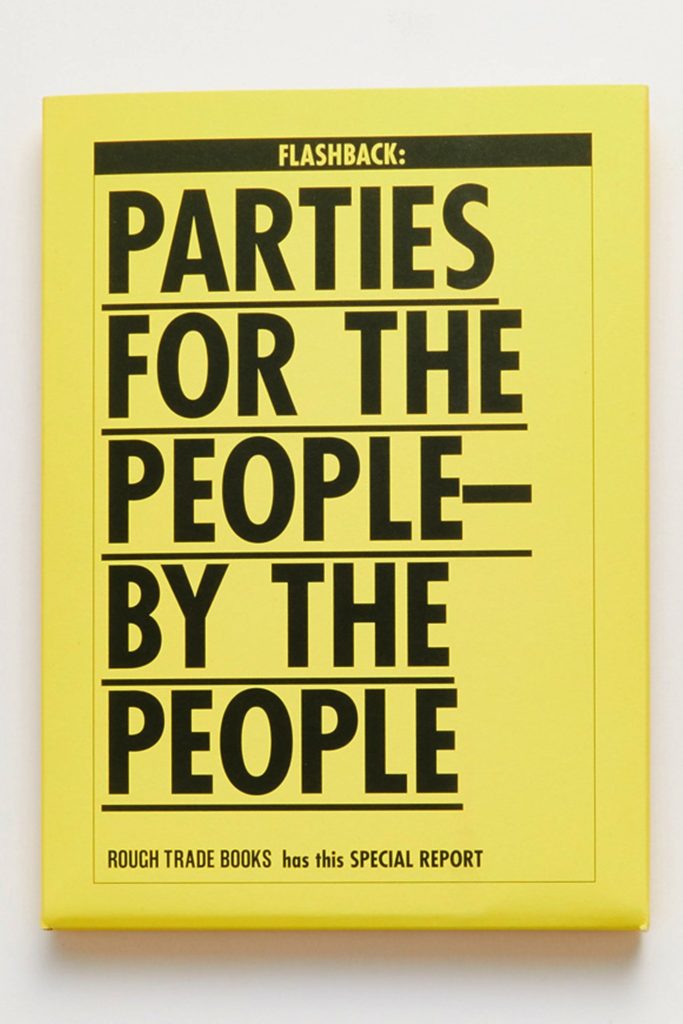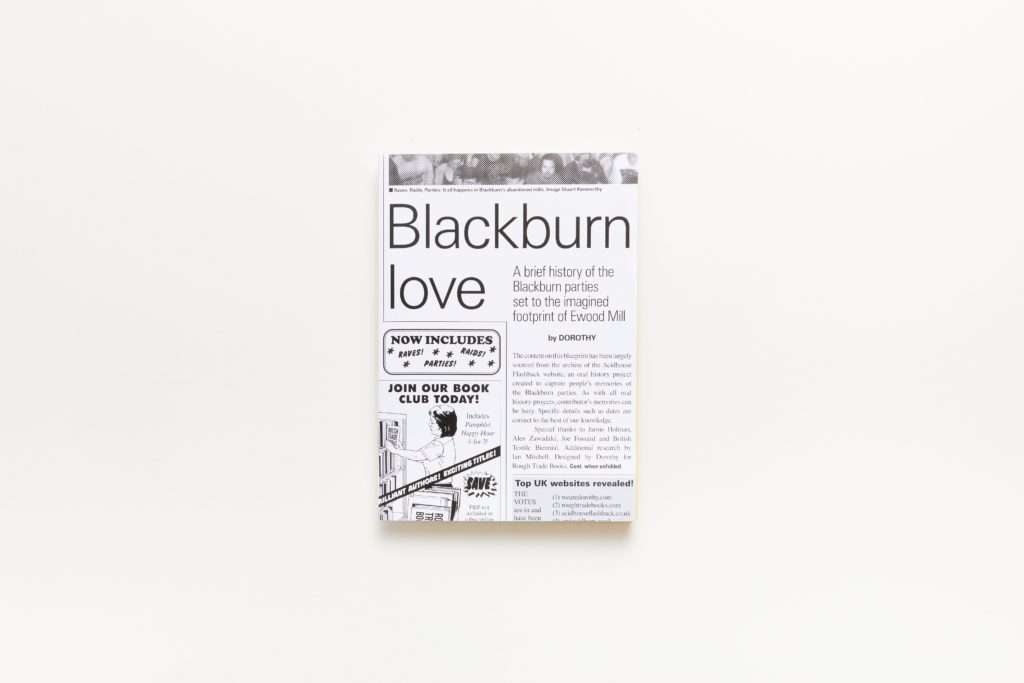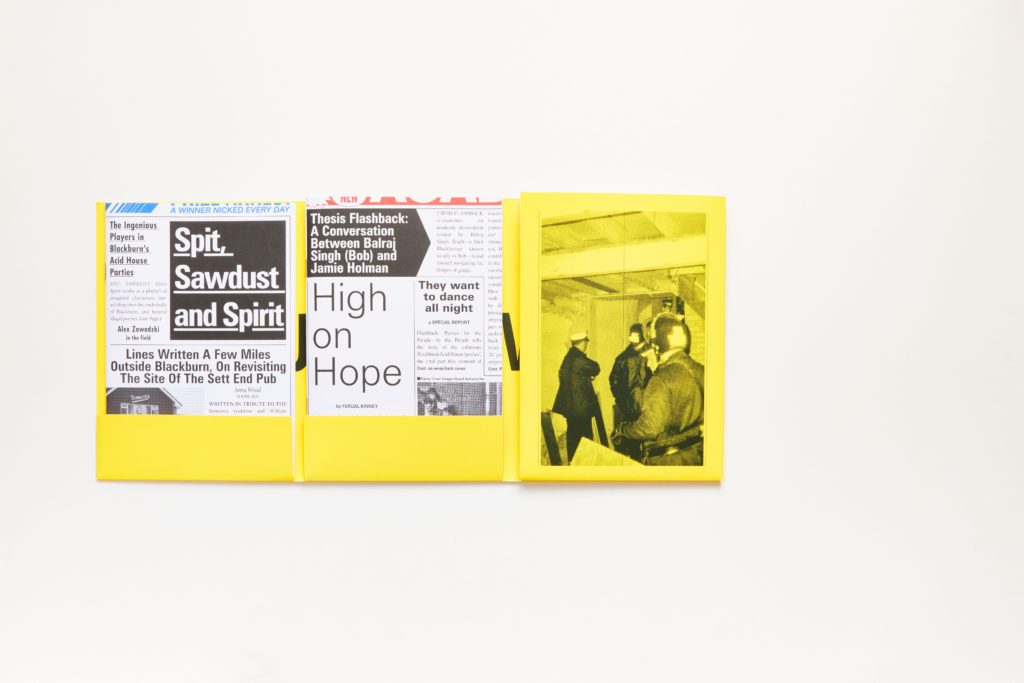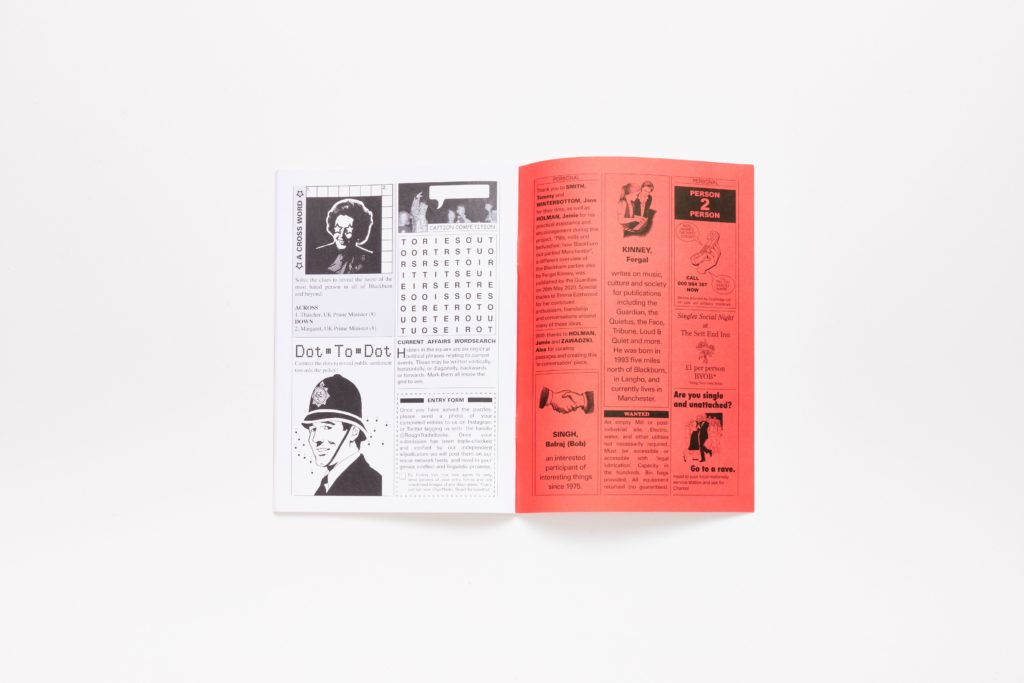Emma Warren delves into a Rough Trade Books edition on the subject of Blackburn’s rich rave history. All photos by Beth Davis.

Rough Trade books have been playing with form as well as content for a while now. Last year’s collection of solo writings by 4 Brown Girls Who Write came in a textured gatefold with extra fold-outs which held each pamphlet separately. Their new release documents the culturally-specific way raves took off in Blackburn 1988-1990. It does this through a variety of means: first person reflection, fictionalised oral history, a poem by Anna Wood and a transportive ‘shadow story’ by Adelle Stripe that brings the reader into a borrowed car travelling towards one of the parties. It also does so via a joyful map-as-family-tree by Liverpool studio Dorothy as well as through spoof ads, readers’ letters and crosswords which are laced through the whole thing. The ads are the work of RTB designer Craig Oldham and amplify the brilliant stories within this collection like the rawest of Kevin Saunderson’s Detroit-built Reese basslines: It’s one thing to tell a story about parties and over-policing, as with the 836 citizens arrested after the Love Decade party in July 1990 near Leeds, and another to do so alongside an clip art ad which says ‘Need help getting beaten up? Why not call the police! Tel. 999’.

The authors of Flashback: Parties for the People… are calling their pamphlet collection an archive, which I like, because it helps shift this form of backwards-facing information-gathering away from nostalgia (which as Gil Scott-Heron voiced it, has a ‘no’ at the start) and into the idea of archive as information base and blueprint. This is important. I wonder what I’d have got from reminiscences about 1958 when I first started going out as a mid-teen suburban Londoner in autumn 1988. What could have jumped across that crevasse, three decades wide? Perhaps information presented like this, in the spirit of encouragement. ‘We should be wary of rave nostalgia,’ Fergal Kinney writes in the final paragraphs of the collection, ‘but instead take the ideas of the Blackburn parties and find use for them in our own lives, music scenes and communities…carry it forward. Better options always exist, and Blackburn is just one of the battle sites.’
The dances that erupted in the late 1980s across the UK reflected the specific context people were living in, and it also expressed lineage; something which comes across in Jamie Holman’s brilliant ‘constructed narrative’ titled Howling Roughs. It connects Blackburn casuals and their obsession with fine clothing to the textile mills that had employed their grandparents. The unnamed narrator, whose story is constructed from a number of real-life testimonies, makes the link: ‘We had stopped making cloth in Blackburn but a hundred years of handling the best textiles in the world is in our DNA. We know what good gear is, we know how to look smart.’ Or later in the same monologue, during an evocation of the locally-famous Blackburn-Switzerland shoplifting trips which were facilitated by the purchase of an Interrail ticket: ‘I loved the idea of it, the descendants of Blackburn weavers roaming across Europe chasing these beautiful clothes.’ This connection between raves and prestige fabric builds on Jeremy Deller’s factory-facing Everybody In The Place, but also relies on the fact that the Flashback archive was developed for the 2019 British Textile Biennial programme – perhaps a good example of finding connections by looking at one story through the lens of another.

Anna Wood’s gorgeous poem ‘Lines Written A Few Miles Outside Blackburn, On Revisiting The Site Of The Sett End Pub, April 10, 2021’ contains embodied recollections familiar to anyone that spent hours on similar dancefloors, or at least, to me: ‘I feel those basslines/ Rolling out again from my deepest pulse’.
And later:
An unspoken, predicted life melted
Into those sticky carpets, as I danced
I moved out of control, into softness
Another pamphlet in the collection kicks off with a conversation between Jamie Holman and Balraj ‘Bob’ Singh, who wrote a dissertation on the Blackburn raves for his university degree in 2003, before most people were thinking about these collective uprisings as ‘culture’. He wrote it at a remove of more than a decade, but from first-hand experience. He’d lived Blackburn life before the parties (in short – plenty of everyday peril) and he lived through three years of hardcore uproar which shifted previously-fixed factionalism of geography or ethnicity. He also lived this factionalism as someone from Blackburn who was also South Asian, giving him a specific perspective on football, unemployment, community, fashion, drugs and music. The conversation is illuminating.
This Rough Trade Books release is part of a larger online archive, collected over eight months by Alex Zawadski who runs Blackburn’s Prism Contemporary gallery, and artist, curator and lecturer Jamie Holman as UnCultured Creatives. They interviewed party organisers, police, DJs, residents, sound engineers and party-goers and also collected flyers, photos, press cuttings and fanzines from the time. The results are hosted on the Flashback website, along with video interviews and short clips that collect together fragments of archive material around a quote from one of the interviewees.

This retrospective work is also being done by Youth Club and Rendezvous Projects, who are charting the London borough of Walthamstow’s pirate radio and rave histories, and by the people currently crowd-funding for All We Wanna Do Is Dance, a long-in-the-making documentary of acid house times which includes eye-opening testimony from police and promoters, including one scene where former adversaries are interviewed together whilst playing the Rave boardgame. The work is also being done in the present tense by current collectives like Partisan in Manchester, and Imaginary Millions in London, where people are documenting their own stories from within, whilst it’s happening.
Parties For The People – By The People is personal, political, funny and shocking. It’s thought-provoking, too. Did the state really turn a blind eye to the cheap heroin that flooded de-industrialised towns across the UK, as happened in the US with crack cocaine? We’ll never know and there’s little point craning at the unknowable. But publications like this, where the telling is collaboratively shared with the makers and do-ers, answer another question loud and clear: that people who make culture need to be central to the telling and myth-making, whether it’s at the time or decades afterwards. Stories for the people, by the people have more juice and more nuance, just like this essential publication.
*
‘Flashback: Parties for the People – by the People’ is out now and available here (£20.00).